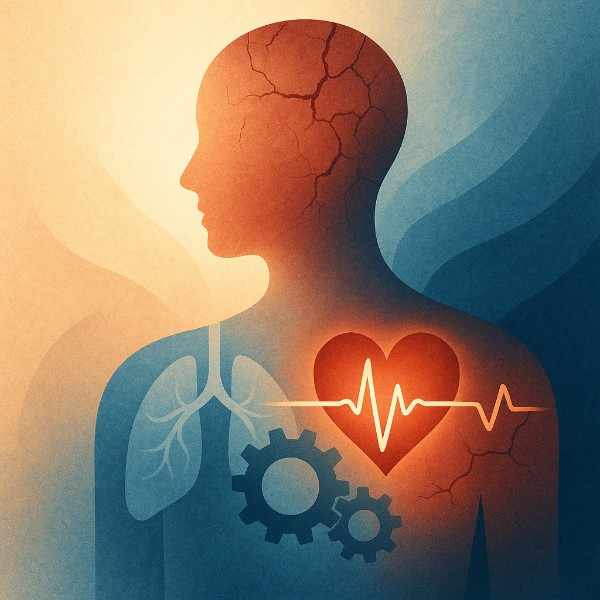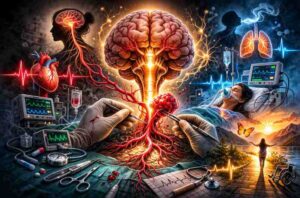Doctors rarely have the time for the emotional aspect of medicine but often, it’s what gives patients succour
Zane walked into the office holding Sanjana’s hand, who shuffled in with a bit of a limp. They were a young couple in their 40s, but they helped each other settle into their chairs like 80-year-olds do – slowly, gingerly, tenderly. As I directed my gaze towards Sanjana to ask about her problem, she shook her head sideways, pointing her thumb at her husband. “Don’t look at me; he’s the patient,” she said, articulately lifting the veil of perception we subconsciously carry within us.
I asked him what the issue was. “I had an aneurysm that ruptured in June 2020,” he said, a little saliva drooling from the corner of his mouth. His speech was slightly slurred and garbled, with the intonation of someone who’s been intoxicated. “They did an operation in Singapore to treat it, but now we’ve moved back to Mumbai and I need someone to fix back the skull, which they had removed at the time of the operation because of brain swelling,” he explained, taking off his monkey cap to show me the defect over the right side of his head, which caved in like a saucer. “They tried to place it back 9 months after surgery, but it got infected twice and they had to discard it,” Sanjana chipped in, pointing to the scarred areas on his scalp that now looked like a battlefield after the war was over.
I explained why we would have to treat the skin with tissue expanders before we could design a customized titanium plate to refashion his skull, and that that process would take a few months. “While you’re at it, perhaps you could also help me get his life back. He’s just not the same person anymore. It’s like he’s completely checked out. He’s physically in the same room, but emotionally or mentally, I don’t know what he’s thinking or feeling any more. He’s not willing to get a job; he sits at home all day and goes through intense bouts of anger,” she gave me the emotional side of clinical medicine, which we, as doctors, often don’t have time to indulge in. “Tell me more about him,” I wanted to help. “He worked at BusinessTech, in the travel domain, and was head of management consulting for Asia, Africa, and the Middle East – the blue eyed boy at work until this happened and turned our life around completely,” she said, her eyes welling up. Before I could reach out, she got up and walked across the office to grab a tissue from above the wash basin. Zane looked at her with concern.
“And why are you limping?” I asked curiously. “I was run over by a drunk driver when I was 8,” she said with unparallel stoicism. “I needed 3 surgeries where my leg was amputated at the hip. I contracted Hepatitis B during the first blood transfusion, and was in the hospital for 60 days, but my parents were told to wait for me to die from the hepatitis. I have somehow programmed myself to overcompensate so that people can see me before my disability,” she said, mentioning that the gait was due to her prosthesis, which goes up the hip and needs to be disarticulated every time she needs to use the washroom.
She told me she met Zane through common friends, and surprisingly, he never saw her differently like most other people did. “Till date, I am amazed by his ability to love and accept people as they are,” she said with glee. She had the best kind of marriage anyone could wish for. “For my entire pregnancy, I was on crutches and a wheelchair because I couldn’t use my prosthesis, as it covered my abdomen,” she told me. “He would religiously take me for a walk every day, wheeling me along non-existent sidewalks in the city,” she looked at him fondly, and he looked back as if it was no big deal. They moved to Singapore in 2016 when their daughter was a year old. He took care of them financially, emotionally, and physically. He was the most involved dad and a true son to her parents. “He was as good as it gets,” she declared.
“But now, it’s not good anymore,” she confessed. She believed she had underestimated the impact of this rupture. “After hoping and praying for a few long years, I have accepted that he may never be the same person again.” “And that’s okay,” I completed the sentence. “Most people will have 3 or 4 marriages in their lifetime, albeit to the same person,” I explained. No two people remain the same. No situation is constant. All circumstances are beyond our control.
“Life is more random than you think,” Nassim Nicholas Taleb once wrote, adding, “and your ability to navigate it rationally is more limited than you think.” We discussed the various options through which we would get Zane back to speed and how he could be gainfully employed again. He promised he would try his best – for himself, for them.
I imagined how most people in their circle would enquire about Zane while seeming not to acknowledge Sanjana’s disability. Even if she voiced how she was feeling, she would be fed with toxic positivity. I figured how they’d be unintentionally excluded from social functions now because Zane didn’t interact much anymore. I realised how no one understands the caretaker’s burden. I speculated how we wait for people to fall ill to be nice to them, to understand them, to go back to loving them – but sometimes even that is not enough. “And that’s okay, too.” I told myself. I thought of how patients come to doctors for help and how doctors take on the role of being their therapist, while in reality, it is the doctor who is in therapy.





23 thoughts on “The surgical therapist”
A very insightful article and very true
Ur ending was always awestuck to me….
Its the doctor who s in therapy…
Very true
Very nice post sir
So very well articulated, the bit about 3-4 marriages to the same person , no one understands the caretakers burden and ” that’s okay too” were the most important messages
I loved your philosophy of life & marriage:
“Most people will have 3 or 4 marriages in their lifetime, albeit to the same person,” I explained. No two people remain the same. No situation is constant. All circumstances are beyond our control.
Very profound!! Indeed, what often contributes significantly to physical healing is the emotional wellbeing and mental peace. It is also true that when there is sickness in the family, often people enquire about the sick and seldom about the caregiver. What is even worse, is the assumption that doctors, will have inherent capacity to provide both healing and therapy, which they often need desperately too!!
Dil ko chhu lene wali baat hai Sir. 👌
Dil ko chhu lene Wali baat hai Sir 🙏👌
Dr.Mazda you place in some interesting facts of doctor-patient relationship in a very creative way. The articles do not get boring at any point. That’s the beauty of your writing skills.
Please continue sharing your thoughts and learnings.
As usual very written, you have the knack of writing and you ensure that the your audience gets something different to read every week and you keep them glued till the end of your article.
After reading I am dum stuck, I don’t know what to say even think about, God is great but my heart is with people whom I respect the most.
Very well articulated
Amazing pen down as always!!!
Indeed if we want we learn practical
tips from our patients life!!!
A true real life story which i suppose is most beautiful about a couple who r so caring for one another in such difficult situation when we feel like giving up. Thank u for giving us glimpse in to their lives. May b we can b therapy to someone.
Dr Mazda,You are the Good Samaritan ..probably for all your patients. You delve deep into the patient..take away their troubles and 100% cure them physically & mentally.
Touching article. Shows how insightful and intuitive you are. God bless you with a long healthy happy contented life with family
Hi Mazda An interesting article – there always many sides to a challenge and it is always good to appreciate the emotional issues.
A married Indian woman aka wife is expected to live her life thru thick n thin with her husband fr her lifetime during which life meanders thru health n illness . The ailing recovers n the care giver suffers meanwhile, that’s the irony of life!
There’s always something to learn from
Every narrative you share. Keep them coming Doc!! Thank you!
Very profound and a thought provoking write up Dr Mazda.
Always await for your article every Sunday.
Every week it’s something new and different experience of yours.
God bless sir
Hiya Doc !
That’s why I’ve always maintained… you’re a humble man with a kind heart !
Zane and Sanjana are blessed to have found you and shall avail your medical expertise !
I’ve said this before and yet saying it again as a gentle and constant reminder… stay the way you are Doc, please don’t let success get the better of you ever 🤗❤️
What a narrative….reinforces your belief in all those basic values in life, not to mention the quotient of human resilience.
Brilliant piece with all those small but deep insights of life. ‘3-4 marriages in a lifetime’ with the rider ‘to the same person’
And of course the doctor who is in therapy…..
So conclusive…. I